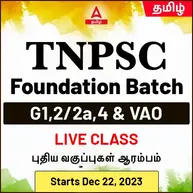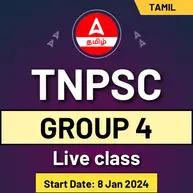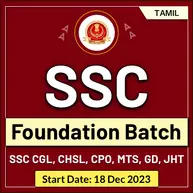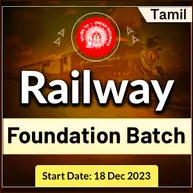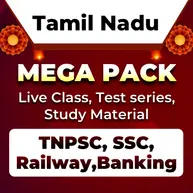
TNPSC Group 1, TNPSC Group 2/2A, TNPSC Group 4, TNUSRB, TNFUSRC, IBPS, SSC, IBPS RRB, SBI, RRB மற்றும் பிற போட்டித் தேர்வுகளுக்கான கேள்வி-பதில்கள்.
Q1. சுயாட்சியாளர்கள் தொடர்பான பின்வரும் அறிக்கைகளை கவனியுங்கள்
- அக்டோபர் 1923 இல் வெளியிடப்பட்ட சுயாட்சி அறிக்கை ஒரு வலுவான ஏகாதிபத்திய எதிர்ப்பு நிலைப்பாட்டை எடுத்தது
- காலனித்துவ ஆட்சியின் படிப்படியான மாற்றத்திற்கு சபைகளை உறுப்புகளாகப் பயன்படுத்த சுயாட்சியாளர்கள் விரும்பினார்
மேலே கொடுக்கப்பட்ட கூற்றுகளில் எது/எவை சரியானது ?
(a) 1 மட்டுமே
(b) 2 மட்டுமே
(c) 1 மற்றும் 2 இரண்டும்
(d) 1 அல்லது 2 இரண்டும் அல்ல
Q2. பின்வருவனவற்றில் யார் “நோ சேன்ஜர்ஸ் ( மாற்றங்களை விரும்பாதோர் )”
- சி.ராஜகோபாலாச்சாரி
- வல்லபாய் படேல்
- ராஜேந்திர பிரசாத்
- சி.ஆர்.தாஸ்
கீழே இருந்து சரியான குறியீட்டைத் தேர்ந்தெடுக்கவும்:
(a) 1, 2, 3
(b) 2, 3, 4
(c) 1, 4
(d) 1, 2, 3, 4
Q3. பின்வரும் அறிக்கைகளை ஆராயுங்கள்
- ‘மாற்றங்களை விரும்பாதோர்” சபை நுழைவை எதிர்த்தனர், ஆக்கபூர்வமான பணிகளில் கவனம் செலுத்த வேண்டும் என்று வாதிட்டனர்
- இடைநிறுத்தப்பட்ட சட்ட ஒத்துழையாமை இயக்கத்தை மீண்டும் அமைதியான முறையில் தொடங்க விரும்பினர்
மேலே கொடுக்கப்பட்ட கூற்றுகளில் எது/எவை சரியானது ?
(a) 1 மட்டுமே
(b) 2 மட்டுமே
(c) 1 மற்றும் 2 இரண்டும்
(d) 1 அல்லது 2 இரண்டும் அல்ல
Q4. காங்கிரஸ் கூட்டத்திற்கு காந்திஜி ஒரு முறை மட்டுமே தலைமை தாங்கினார். அந்த அமர்வு .-
(a) லாகூர் அமர்வு
(b) பம்பாய் அமர்வு
(c) பெல்காம் அமர்வு
(d) சூரத் அமர்வு
Q5. “மாற்றங்களை விரும்பாதோர்” பணி குறித்து பின்வரும் அறிக்கைகளைக் கவனியுங்கள்
- அவர்கள் சர்கா மற்றும் காதி பயன்பாட்டை பிரபலப்படுத்தினர்
- அவர்கள் வெளிநாட்டு துணி மற்றும் மதுபானங்களை புறக்கணித்தனர்
- அவர்கள் பெரும்பாலும் தீண்டத்தகாதவர்களைக் கொண்ட நிலமற்ற மற்றும் விவசாயத் தொழிலாளர்களின் பொருளாதார குறைகளில் கவனம் செலுத்தினர்
மேலே கொடுக்கப்பட்ட கூற்றுகளில் எது/எவை சரியானது ?
(a) 1 மற்றும் 2
(b) 2 மற்றும் 3
(c) 1 மற்றும் 3
(d) 1, 2, 3
Q6. தொழிற்சங்க இயக்கம் 1920 இல் நிறுவப்பட்ட அகில இந்திய தொழிற்சங்க காங்கிரஸ் (ஏ.ஐ.டி.யூ.சி) தலைமையில் நடைபெற்றது. பின்வருபவர்களில் AITUC இன் யார் முதல் தலைவர்?
(a) லாலா லஜ்பதி ராய்
(b) திவான் சாமன் லால்
(c) விதல் பாய் படேல்
(d) வல்லப் பாய் படேல்
Q7. சியாதவாடாவின் கோட்பாடு பின்வரும் எந்த பிரிவுகளுக்கு சொந்தமானது?
(a) புத்தம்
(b) சமண மதம்
(c) அஜிவிகா
(d) ஷைவம்
Q8. நேரடி செயல் நாள் எதற்காக நடைமுறையில் இருந்தது:
(a) தனி பாகிஸ்தானுக்கு கேபினட் மிஷன் ஒப்புதல் அளிக்கவில்லை, முஸ்லிம் லீக் அதை விரும்பியது
(b) இந்தியாவுக்கும் பாகிஸ்தானுக்கும் பிரிக்கப்பட்ட பகுதிகள் சமமற்றவை என்று முஸ்லீம் லீக் கருத்து தெரிவித்தது
(c) இடைக்கால அரசாங்கத்தில் முஸ்லிம் லீக் பங்கேற்க வேண்டும் என்று காங்கிரஸ் விரும்பியது
(d) கல்கத்தா கொலைகளின் போது இந்துக்கள் செய்த அட்டூழியங்களுக்கு எதிர்ப்பு
Q9. பின்வரும் சங்கங்களில் எது முதன்மையாக சாதி பாகுபாட்டிற்கான குரலாகப் பரவுகிறது
- நீதிக் கட்சி
- தீவிரமான ஏழவாஸ்
- யூனியனிஸ்ட் கட்சி
மேலே கொடுக்கப்பட்ட கூற்றுகளில் எது/எவை சரியானது ?
(a) 1 மற்றும் 2
(b) 2 மற்றும் 3
(c) 1 மற்றும் 3
(d) 1, 2, 3
Q10. வட இந்திய இடைக்கால பேரரசுகளின் சூழலில் ‘ஜாவாபிட்’ என்பதன் பொருள்
(a) சுல்தான்கள் மற்றும் பாட்ஷாக்கள் ஆளுகைக்கு உதவுவதற்காக அறிவிக்கப்பட்ட மதச்சார்பற்ற சட்டங்கள் / ஆணைகள்.
(b) உண்மையுள்ள விசாரிக்கும் மக்களால் கேட்கப்படும் கேள்விகளுக்கு மௌலவிகளால் வழங்கப்பட்ட பதில்கள்.
(c) நில வருவாயைத் தீர்மானிக்க நில அளவீட்டு அலகு.
(d) சிஷ்டி சில்சிலாக்களின் சூஃபிகள் பாடிய பக்தி பாடல்கள்
To Attempt the Quiz on APP with Timings & All India Rank,
Download the app now, Click here
Solutions
S1.Ans.(a)
Sol.
As per swaraj is
The councils could be used as an arena of political struggle but there was no intention to use the councils as organs for the gradual transformation of colonial rule
The Swarajist Manifesto for Elections Released in October 1923, the Swarajist manifesto took a strong anti-imperialist line. The points put forward were as follows.
- The guiding motive of the British in governing India lay in the selfish interests of their own country;
- The so-called reforms were only a blind to further the said interests under the pretense of granting a responsible government, the real objective being to continue exploitation of the unlimited resources of the country by keeping Indians permanently in a subservient position to Britain;
- The Swarajists would present the nationalist demand of self-government in councils;
- If this demand was rejected, they would adopt a policy of uniform, continuous and consistent obstruction within the councils to make governance through councils impossible;
- Councils would thus be wrecked from within by creating deadlocks on every measure.
S2.Ans.(a)
Sol.
After Gandhi’s arrest (March 1922), there was disintegration, disorganization, and demoralization among nationalist ranks. A debate started among Congressmen on what to do during the transition period, i.e., the passive phase of the movement. One section led by C.R. Das, Motilal Nehru, and Ajmal Khan wanted an end to the boycott of legislative councils so that the nationalists could enter them to expose the basic weaknesses of these assemblies and use these councils as an arena of political struggle to arouse popular enthusiasm
Those advocating entry into legislative councils came. to be known as the ‘Swarajists’, while the other school of thought led by C. Rajagopalachari, Vallabhbhai Patel, Rajendra Prasad, and M.A. Ansari came to be known as the ‘Nochangers’
S3.Ans.(c)
Sol.
The ‘No-changers’ opposed council entry, advocated concentration on constructive work, and continuation of boycott and non-cooperation, and quiet preparation for the resumption of the suspended civil disobedience program.
S4.Ans.(c)
Sol.
The Swarajists were allowed to contest elections as a group within Congress. The Swarajists accepted the Congress program with only one difference—that they would join legislative councils. The elections to the newly constituted Central Legislative Assembly and to provincial assemblies were to be held in November 1923.
Both sides came to an agreement in 1924 (endorsed at the Belgaum session of the Congress in December 1924 over which Gandhi—the only time—presided over the Congress session) that the Swarajists would work in the councils as an integral part of the Congress.
S5.Ans.(a)
Sol.
The No-Changers devoted themselves to constructive work that connected them to the different sections of the masses. (i) Ashrams sprang up where young men and women worked among tribals and lower castes (especially in Kheda and Bardoli areas of Gujarat) and popularised the use of charkha and khadi. (ii) National schools and colleges were set up where students were trained in a non-colonial ideological framework. (iii) Significant work was done for Hindu-Muslim unity, removing untouchability, a boycott of foreign cloth and liquor, and flood relief. (iv) The constructive workers served as the backbone of civil disobedience as active organizers
While campaigning about the social aspect of untouchability, no emphasis was laid on the economic grievances of the landless and agricultural laborers comprising mostly the untouchables
S6.Ans.(a)
Sol.
The trade union movement was led by the All India Trade Union Congress (AITUC) founded in 1920. Lala Lajpat Rai was its first president and Dewan Chaman Lal its general secretary. Tilak was also one of the moving spirits
S7.Ans.(b)
Sol.
Option (b) – Jainism, is the correct answer. Syadvada is a concept in Jainism. According to this
doctrine all judgments are conditional, holding good only in certain conditions, circumstances, or senses, expressed by the word syat (Sanskrit: “maybe”). The ways of looking at a thing are infinite in number. The Jainas hold that to interpret experience from only one Naya, or point of view, to the exclusion of others is an error comparable to that of the seven blind men feeling an elephant, each of whom concluded that the part he was holding represented the elephant’s true form.
S8.Ans.(a)
Sol.
The Cabinet Mission proposed an initial plan of the composition of the new Dominion of India and its government. But an alternative plan to divide the British Raj into a Hindu- majority Indian and a Muslim majority Pakistan was proposed by the Muslim League. Congress rejected the alternative proposal outright. The Muslim League planned a general strike (hartal) on 16 August, terming it as Direct Action Day, to protest this rejection and assert its demand for a separate Muslim homeland.
S9.Ans.(d)
Sol.
Justice Party (Madras)
- Self-respect movement (1925) under “Periyar”—E.V. Ramaswamy Naicker (Madras)
- Satyashodhak activists in Satara (Maharashtra)
- Bhaskar Rao Jadhav (Maharashtra)
- Mahars under Ambedkar (Maharashtra)
- Radical Ezhavas under K. Aiyappan and C. Kesavan in Kerala
- Yadavs in Bihar for improvement in social status
- Unionist Party under Fazl-i-Hussain (Punjab).
S10.Ans.(c)
Sol.
Zawabits were secular decrees promulgated by the sultans. They aided their administration along with the religious laws provided by Sharia and Hadis. Both Muhammad Bin Tughalaq and Alauddin Khilji are known for their zawabits. Aurangzeb Padhshah’s zawabits are compiled in a book named Zawabit-i-Alamgiri. His religious firmans are also composed in a compendium called fatwah-i-alamgiri. Thus he indulged in both secular laws as well as attempted to modify Sunni mazhab as per his understanding of piety. He was also referred to as Zinda Pir for his simple living and pious religious adherence to orthodox Sunni Islam. Units of land measurement kept evolving over medieval times with changing reigns. The basics used were either length of rope (zarb) or length of the stick (e.g.gaj-esikandari, gaj-e-ilahi). Songs of devotion sung by the Sufis are of various types – dervish sung their songs while revolving around themselves, Chishtis chanted meditatively, but in communion, some dancing rituals were called raqs while individual confinement in solitude with songs was called chilla.
Use Coupon code: JUNE77 (77% offer)
*இப்போது உங்கள் வீட்டில் தமிழில் நேரடி வகுப்புகள் கிடைக்கின்றன*
*பயிற்சி மட்டுமே தேர்வுர உங்களுக்கு உதவ முடியும் | Adda247 தமிழ் மூலம் உங்கள் பயிற்சியை இப்போது தொடங்கவும்*

